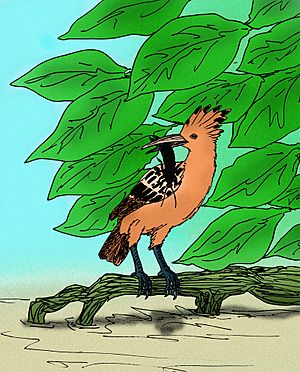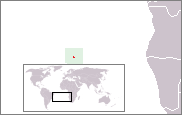Saint Helena hoopoe facts for kids
Quick facts for kids Saint Helena hoopoe |
|
|---|---|
 |
|
| Conservation status | |
| Scientific classification |
|
| Kingdom: | Animalia |
| Phylum: | Chordata |
| Class: | Aves |
| Order: | Bucerotiformes |
| Family: | Upupidae |
| Genus: | Upupa |
| Species: |
†U. antaios
|
| Binomial name | |
| †Upupa antaios (Olson, 1975)
|
|
 |
|
| Location of Saint Helena | |
| Script error: The function "autoWithCaption" does not exist. | |
| Synonyms | |
|
Upupa antaois (lapsus) |
|
Script error: No such module "Check for conflicting parameters".
The Saint Helena hoopoe (Upupa antaios) was a special type of hoopoe bird. People also called it the Saint Helena giant hoopoe because it was quite large. This bird is now extinct, meaning it no longer exists anywhere in the world.
Scientists know about this bird only from a few fossil bones. The last time anyone saw a Saint Helena hoopoe was around the year 1550.
Contents
About the Saint Helena Hoopoe
The Saint Helena hoopoe lived only on one island. This island is called Saint Helena and is in the South Atlantic Ocean. When an animal lives only in one place, we say it is endemic to that place.
What Made it Special
One very interesting thing about the Saint Helena hoopoe was that it probably could not fly. Most birds use their wings to fly, but some, like penguins or ostriches, cannot. This bird was likely one of them.
How We Found Out About It
The first hint of this unique bird came in 1963. A British scientist named Philip Ashmole found a bone from a bird's wing. This bone, called a humerus, was different from other hoopoe bones. It suggested a new, unknown species.
Later, in 1975, another scientist found more bones. This scientist was a palaeontologist named Storrs L. Olson. He discovered parts of the bird's shoulder bones, called coracoids, and a leg bone, called a femur. These bones helped scientists understand more about the Saint Helena hoopoe. They confirmed it was a giant, flightless bird.
Why It Disappeared
The Saint Helena hoopoe became extinct in the early 1500s. This was around the time humans first arrived on Saint Helena island. Many island animals are not used to predators like rats, cats, or pigs that humans bring. These new animals, along with humans hunting, often cause island species to disappear.
See also
 In Spanish: Abubilla de Santa Helena para niños
In Spanish: Abubilla de Santa Helena para niños
 | Tommie Smith |
 | Simone Manuel |
 | Shani Davis |
 | Simone Biles |
 | Alice Coachman |


